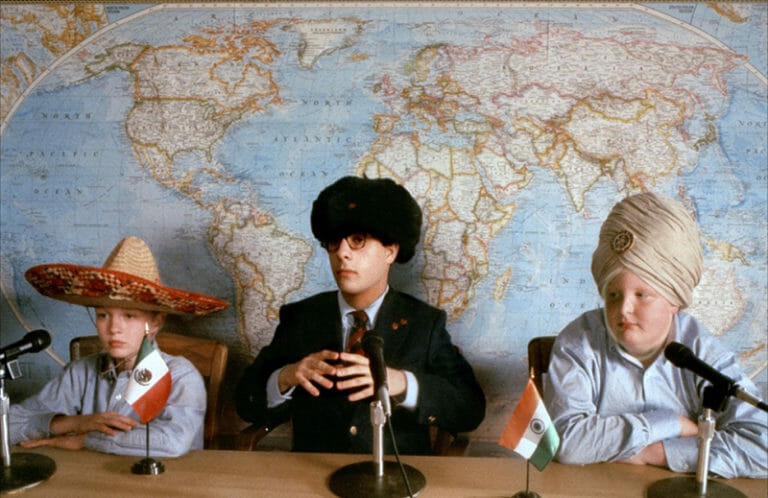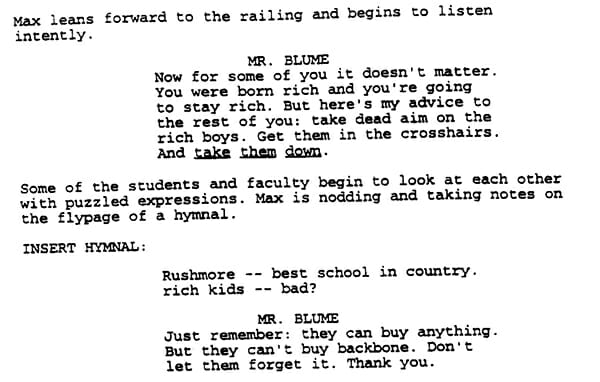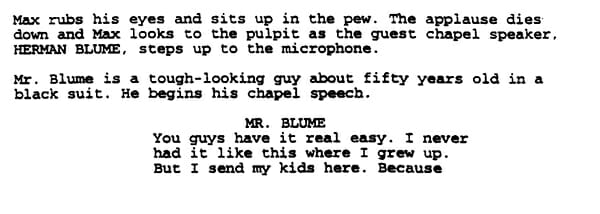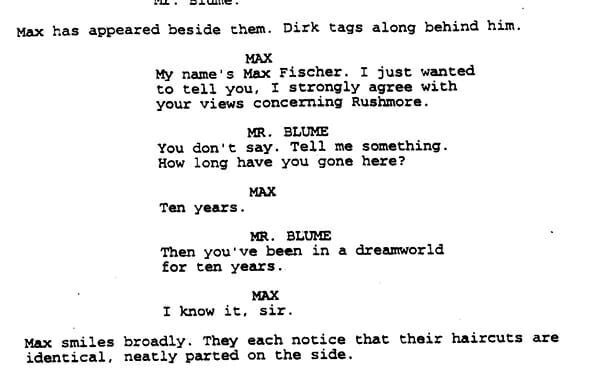By Staff · July 7, 2017

Screenplay by: Wes Anderson, Owen Wilson
Breakdown by: Megan Tambio
Wes Anderson’s seminal Rushmore centers around a high end, all boys academy and its number 1 fan/ student Max Fischer (Jason Schwartzman). Max befriends a depressed Rushmore parent Mr. Blume (Bill Murray) and falls for new Rushmore teacher Miss Cross (Olivia Williams). But Max’s life is turned upside down as Blume and Cross fall for each other and his future at his beloved school becomes uncertain.
 Even to the laymen, Wes Anderson has a very distinct tone as a film maker. While sometimes getting flack for being overly hipster, there’s a precision and balance to his work: the slightly absurd speechifying against the rich of the decidedly well- off Mr. Blume at a student chapel and the even more comical seriousness with which Anderson and our protagonist Max Fischer takes it.
Even to the laymen, Wes Anderson has a very distinct tone as a film maker. While sometimes getting flack for being overly hipster, there’s a precision and balance to his work: the slightly absurd speechifying against the rich of the decidedly well- off Mr. Blume at a student chapel and the even more comical seriousness with which Anderson and our protagonist Max Fischer takes it.
Visuals are also a big part of Rushmore’s comedy, and the script manages to communicate some of that blink- and- you’ll- miss- it visual language. From the first lines of dialogue we get a good sense of the more serious themes that will be driving the plot despite the quirky tone.
Rushmore is largely about the relationship between 3 main characters: Max, Mr. Blume and Miss Cross
 From his first appearance, Max immediately stands out as a peculiarly devoted student of Rushmore Academy. The beginning description makes him seem cool and coifed, but the punchline/ reality of it is that he is really “extremely skinny and pale”- i.e. a normal kid. His larger than life posturing and obsessive extracurricular involvement at Rushmore works to show this duality: his genuine love of the school, and his fear of ever having to leave it. It’s easy to see why Max instantly falls for Miss Cross.
From his first appearance, Max immediately stands out as a peculiarly devoted student of Rushmore Academy. The beginning description makes him seem cool and coifed, but the punchline/ reality of it is that he is really “extremely skinny and pale”- i.e. a normal kid. His larger than life posturing and obsessive extracurricular involvement at Rushmore works to show this duality: his genuine love of the school, and his fear of ever having to leave it. It’s easy to see why Max instantly falls for Miss Cross.
 Anderson and Wilson make an interesting choice in making Cross’ first ‘appearance’ through something she wrote. Max immediately is immediately struck by her insight before he has any idea who she is. Despite the significant difference in age and maturity, Cross and Max are cut from the same cloth- both love Rushmore and the world of learning it represents.
Anderson and Wilson make an interesting choice in making Cross’ first ‘appearance’ through something she wrote. Max immediately is immediately struck by her insight before he has any idea who she is. Despite the significant difference in age and maturity, Cross and Max are cut from the same cloth- both love Rushmore and the world of learning it represents.
This makes Max’s friendship and Miss Cross’ eventual romance with Mr. Blume all the more remarkable. Max and Cross’ dynamic is juxtaposed to show how Mr. Blume- a self- loathing, un- academic alcoholic- is an outsider by comparison.
 As Mr. Blume says, Rushmore is simply the best. It is vastly different than most others’ school days. It’s a private, all boys school with a bee keeping club, fencing, and Kung- Fu- and Max Fischer is the head of nearly all of it.
As Mr. Blume says, Rushmore is simply the best. It is vastly different than most others’ school days. It’s a private, all boys school with a bee keeping club, fencing, and Kung- Fu- and Max Fischer is the head of nearly all of it.
 For all of Max’s talent and intellect, his insecurity is simple: who is he without Rushmore?
For all of Max’s talent and intellect, his insecurity is simple: who is he without Rushmore?
Later in the actual film, after a bitter rivalry is formed between Max and Mr. Blume, Mr. Blume sadly tells Max that Miss Cross is his “Rushmore”.
Max, Mr. Blume, and even Miss Cross have baggage they’re clinging to. Rushmore is an almost fantastical place filled with opportunity, but it’s also a crutch for Max that he has to learn to live without.
 Rushmore is, first and foremost, a character study. Within the first 10 pages, Wilson and Anderson clearly set up Max Fischer- his passion, his intellect, even the insecurity lurking underneath that befall all adolescents. We only get a peek at Mr. Blume and Miss Cross, but we know how these 2 adults figure into Max’s life will play a big part of Rushmore.
Rushmore is, first and foremost, a character study. Within the first 10 pages, Wilson and Anderson clearly set up Max Fischer- his passion, his intellect, even the insecurity lurking underneath that befall all adolescents. We only get a peek at Mr. Blume and Miss Cross, but we know how these 2 adults figure into Max’s life will play a big part of Rushmore.